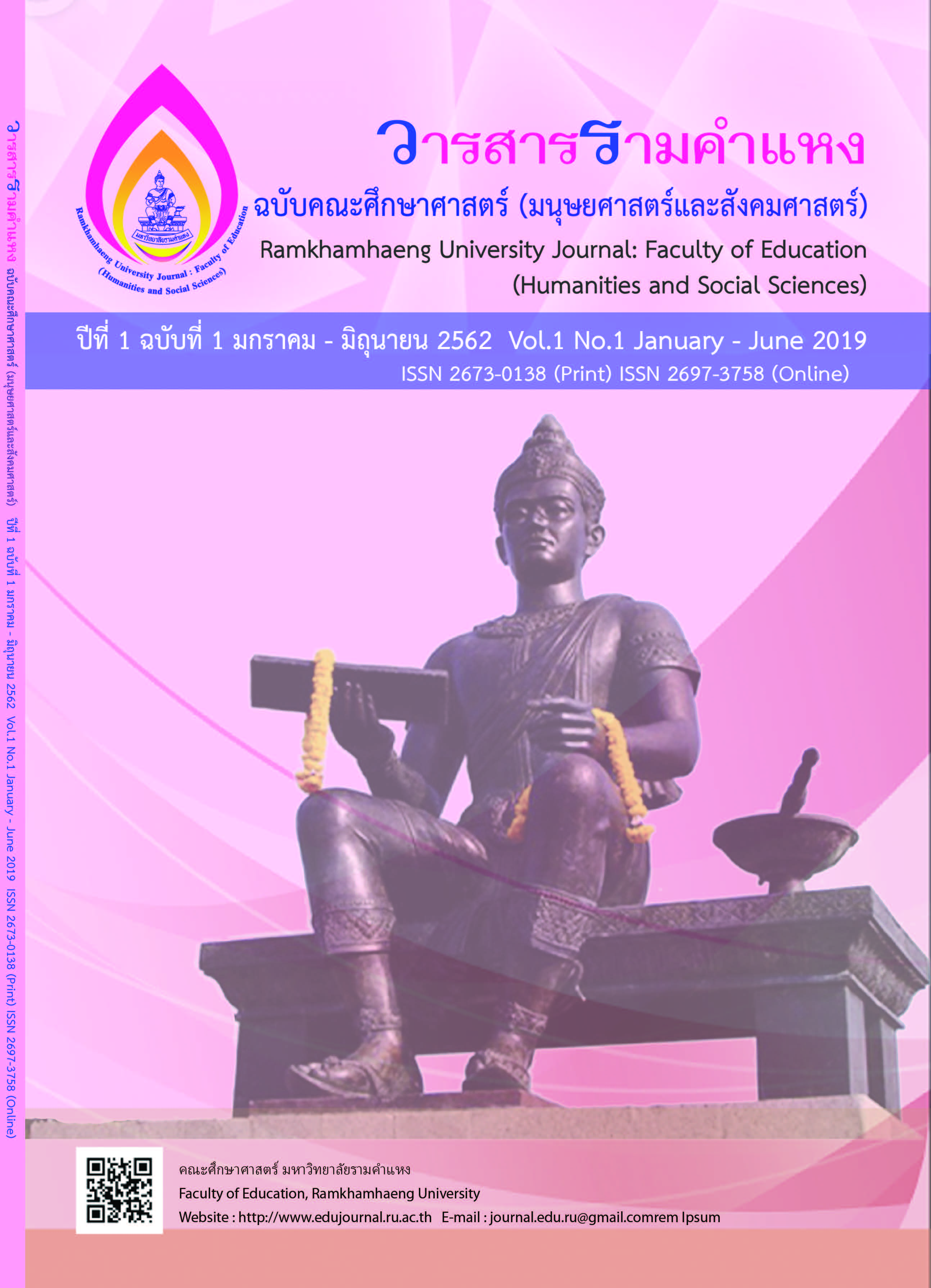อิทธิพลของหลักปรัชญาการศึกษาต่อผลสัมฤทธิ์ทางการศึกษา ของนักเรียนในเขตกรุงเทพมหานคร
Main Article Content
บทคัดย่อ
ปรัชญาการศึกษาเป็นสิ่งชี้นําการจัดการศึกษา นักการศึกษามองและเข้าใจโลกจากแนวทางของปรัชญาที่ตน เชื่อ ดังนั้นจึงจัดการเรียนการสอนตามหลักปรัชญานั้น ครูอาจารย์ทําการสอนตามแนวทางที่ตนเชื่อเกี่ยวกับความเป็นจริง ของโลก ปรัชญาการศึกษานั้นแบ่งออกเป็น 5 แบบคือ ปรัชญาการศึกษาสารัตถนิยม (Essentialism) นิรันตรนิยม (Perennialism) พิพัฒนาการนิยม (Progressivism) ปฏิรูปนิยม (Social Reconstructionism) และอัตถิภาวนิยม (Existentialism) นอกจากนั้นนักวิชาการในประเทศไทยยังยอมรับหลักปรัชญาพุทธปรัชญาการศึกษา (Buddhism) เพิ่มขึ้นอีก 1 ปรัชญา เนื่องจากประเทศไทยยอมรับพุทธศาสนากันอย่างกว้างขวาง สารัตถนิยมนั้นเชื่อว่าความรู้เกิดจากการจําความรู้และภูมิปัญญาที่ถ่ายทอดสืบต่อกันมา นิรันตรนิยมเชื่อว่าควรสอนความรู้เกี่ยวกับธรรมชาติ พิพัฒนาการนิยมเน้นที่กระบวนการเรียนรู้มากกว่าเนื้อหาการเรียนรู้ ปฏิรูปนิยมเน้นการเรียนรู้เพื่อปรับเปลี่ยนสภาพ สังคม อัตถิภาวนิยมเชื่อว่าผู้เรียนมีอิสระในการเลือกสิ่งที่ตนต้องการเรียน และพุทธปรัชญาการศึกษาเชื่อว่าการศึกษา มีเพื่อทําให้ผู้เรียนคิดอย่างเป็นตรรกะและช่วยเหลือสังคม งานวิจัยนี้มีวัตถุประสงค์เพื่อศึกษาหลักปรัชญาการศึกษา ของผู้อํานวยการโรงเรียนมัธยมตอนปลาย และเพื่อศึกษาอิทธิพลของหลักปรัชญาการศึกษาที่มีต่อผลการเรียนของนักเรียนกลุ่มตัวอย่างประกอบด้วยผู้อํานวยการโรงเรียนมัธยมศึกษาตอนปลาย จํานวน 559 คน ในเขต กรุงเทพมหานครที่สังกัด สํานักงานคณะกรรมการการศึกษาขั้นพื้นฐาน กลุ่มตัวอย่างตอบแบบสอบถามที่ออกแบบมา เพื่อจําแนกหลักปรัชญาการศึกษาของผู้ตอบแบบสอบถามส่วนผลสัมฤทธิ์ของนักเรียนคิดจากคะแนน GPA (Grade Point Average) หรือคะแนนสะสมเฉลี่ย โดยนําคะแนน GPA ของนักเรียนทั้งหมดในแต่ละโรงเรียนมาเฉลี่ยรวมกัน เพื่อใช้เป็นคะแนนสัมฤทธิ์ผลของนักเรียนแต่ละโรงเรียน งานวิจัยนี้ใช้การวิเคราะห์การแปรปรวนแบบทางเดียว (One-way ANOVA) เพื่อศึกษาความแตกต่างระหว่างคะแนนสัมฤทธิ์ผลของนักเรียนภายใต้ผู้อํานวยการที่ใช้หลักปรัชญา ต่าง ๆ ผลการวิจัยพบว่า หลักพุทธปรัชญาการศึกษาให้ผลที่ต่ําที่สุด โรงเรียนที่ดําเนินการศึกษาภายใต้หลักปรัชญา อัตถิภาวนิยม (Existentialism) มีผลสัมฤทธิ์สูงที่สุดตามด้วยปฏิรูปนิยม (Social Reconstructionism) สารัตถนิยม (Essentialism) พิพัฒนาการนิยม (Progressivism) นิรันตรนิยม (Perennialism) และพุทธปรัชญาการศึกษา (Buddhism Philosophy) ตามลําดับการทดสอบระดับนัยสําคัญทางสถิติพบว่า อัตถิภาวนิยมและปฏิรูปนิยมนําไปสู่ ผลสัมฤทธิ์ทางการศึกษาที่ดีกว่าปรัชญาการศึกษาแบบอื่น
Downloads
Article Details

อนุญาตภายใต้เงื่อนไข Creative Commons Attribution-NonCommercial-NoDerivatives 4.0 International License.
ผู้ส่งบทความ (และคณะผู้วิจัยทุกคน) ตระหนักและปฎิบัติตามจริยธรรมการวิจัยอย่างเคร่งครัด ทั้งนี้บทความ เนื้อหา ข้อมูล ข้อความ ภาพ ตาราง แผนภาพ แผนผัง หรือข้อคิดเห็นใดๆ ที่ปรากฎในบทความ เป็นความคิดเห็นและความรับผิดชอบของผู้ส่งบทความ กองบรรณาธิการไม่จำเป็นต้องเห็นตามเสมอไป และไม่มีส่วนรับผิดชอบใดๆ โดยถือเป็นความรับผิดของของเจ้าของบทความเพียงผู้เดียว
เอกสารอ้างอิง
Alauddin, M., & Ashman, A. (2014). The changing academic environment and diversity in students' study philosophy, beliefs and attitudes in higher education. Higher Education Research & Development, 33(5), 857-870.
Bernard, W. (2006). Philosophy as a humanistic discipline. Princeton: Princeton University Press.
Christopher, W. (1999). Key concepts in the philosophy of education. London: Routledge.
Guardia, D. L., Gentile, M., Grande, V. D., Ottaviano, S. & Allegra, M. (2014). A game-based learning model for entrepreneurship education. Procedia-Social and Behavioral Sciences, 141, 195-199.
Harold, A. J. (2004). An Introduction to the love of wisdom: An essential and existential approach to philosophy. Lanham, Maryland: Rowman and Littlefield.
Henniger, M. L. (2004). The teaching experience: An introduction to reflective practice. Upper Saddle River, NJ: Pearson Education.
Kneller, G. (1971). Introduction to the philosophy of education. NY: John Wiley & Sons.
Kolb, D. A. (2015). Experiential learning: Experience as the source of learning and development (2nd ed.). Upper Saddle River, NJ: Pearson FT Press.
Komolsevin, R., Knutson, T., Tanchaisak, (2011). A comparison of elephants and eagles: Thai and American communication behavior. Bangkok, Thailand: Wang Aksorn Press.
Leal-Rodriguez, A., & Albort-Morant, G. (2018). Promoting innovative experiential learning practices to improve academic performance: Empirical evidence from a spanish business School. Journal of Innovation & Knowledge, 4(2), 97-103.
Lockett, N., Kerr, R., & Robinson, S. (2008). Multiple perspectives on the challenges for knowledge transfer between higher education institutions and industry. International Small Business Journal: Researching Entrepreneurship, 26(6), 661-681.
Mautner, T. (1996). A dictionary of philosophy. Cambridge, MA: Blackwell.
Oxford Business Group. (2016). The report: Thailand 2016. Retrieved September 20, 2018, from https://oxfordbusinessgroup.com/thailand-2016/sustainability
Ozman, H., & Craver, S. (1999). Philosophical foundations of education (6th ed.). Upper Saddle River, NJ: Merrill/Prentice Hall.
Panorum, P. (2016). The action research in order to access the efficiency of the instructional management under the Thai education philosophy standard in the high school in Buriram province. Journal of Research and Development Buriram Rajabhat University, 11(1), 81-92. [in Thai]
Ruenglertboon, F. (2006). Higher education philosophy of his majesty King Bhumibol Adulyadej (Doctoral Dissertation). Faculty of Education, Chulalongkorn University, Bangkok, Thailand. [in Thai]
Solomon, R. C. (2005). Introducing philosophy: A text with integrated readings. London: Oxford University Press.
Webb, L., Metha, A., & Jordan, K. (2000). Foundations of American education (3rd Ed.). Upper Saddle River, NJ: Merrill/Prentice Hall.
Wongduen, D. (2015). The education philosophy of sufficiency economy in secondary schools under the jurisdiction of 28 districts (Master Thesis). Faculty of Education Administration, Rajabhat Srisaket University, Srisaket, Thailand. [in Thai]
Wongthamma, T. (2012). The basics of educational philosophy: Western vs. eastern wisdoms. Bangkok: Odean Store. [in Thai]


